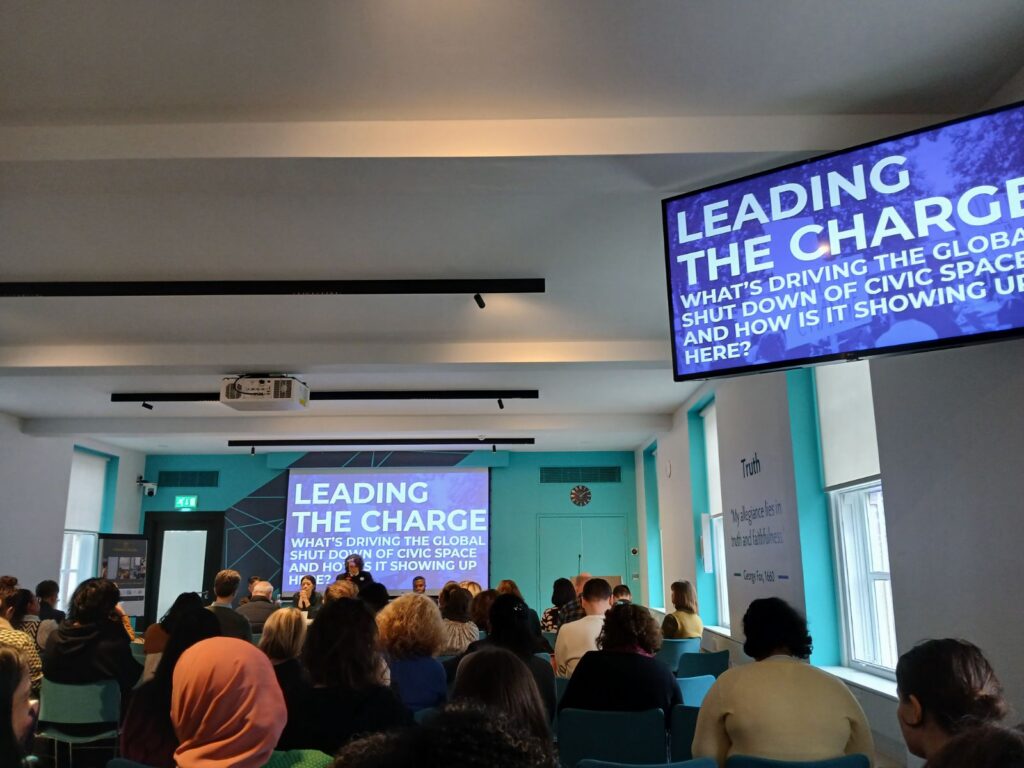What is risk? Why does it matter?

Written by Catherine Scott
Head of Governance and Innovation
This blog is part of a series on risk. If you’re interested in learning more, check out blog 2 on our approach to risk in practice. and blog 3 on navigating power dynamics in risk management.
What do you think of when you hear the word risk?
All of our work over the past few years has been in part looking at how social movements, networks and collectives balance risk against social impact. From years of running Losing Control, to our Risky Business event in 2022 with Schroders, we have pulled risk apart in the light of what is needed for a just and equitable transition. Maybe when you think of risk, you think of a corporate environment, where the focus may be on financial losses and possible gains. Or in the context of health and safety or safeguarding. Or maybe your mind goes to actuaries – amazing minds and equations predicting the statistical likelihood of events occurring. But what does ‘risk’ mean in the context of social change?
Over the next few months we’re going to be sharing more about our thinking on risk: how we approach and manage risk in our work as a fiscal host; exploring who is liable and mitigates the risk; and finally our thoughts on how approaches to risk need to evolve, if we’re going to solve some of society’s biggest challenges. We’re hoping to start a conversation about how we can approach risk differently and share how we’re starting to do that at The Social Change Nest.
About The Social Change Nest
The Social Change Nest CIC (SCN) has a vision of a vibrant, thriving civil society where social change happens from the ground up – and the power to create it is open to all.
We exist to tear down the barriers that prevent people from creating change. We do this by providing impact-led fiscal hosting, grant distribution, grant management, capacity building and infrastructure support to changemakers around the world. Our support enables them to take collective leadership on the things that matter most to them and in doing so, increase civil society space.
Our aims are to:
- Channel funding to grassroots groups
- Support grassroots groups with their admin, skills and capacity
- Inspire change and engagement among funders
Since launching in 2021, we’ve helped distribute over £23 million to grassroots groups and movements and supported funders to get their money into the hands of the people and communities that need it most.
What Is Risk?
In risk management, risk is defined as the possibility of an event, incident or condition that will have an impact, either negative or positive, on the achievement of an organisation’s objectives (ISO 31000:2018; IRM Risk Management Definitions).
Traditional risk management tends to be very organisation-oriented, focusing on the impact of an event, incident or condition on the organisation’s finances, reputation, operational abilities and overall strategic goals. This often leads to decision-making premised on the need for self-preservation, perpetuating a siloed mentality where survival or success is a solo endeavour. It can make it harder to work collaboratively across organisations, share responsibility and accountability and create a culture of collective effort.
Traditional approaches often reflect competitive and individualistic values due to their focus on financial and operational protection of an organisation. But at The Social Change Nest, we approach risk differently. As a fiscal host we take on risk so that others don’t have to. We spend a lot of time thinking and exploring how to support risk and the people taking it, in the best possible way. Although we do think about potential negative impacts on ourselves as an organisation, we balance this with the potential positive impacts for wider civil society. Rather than focusing on the potential for negative outcomes, we prioritise the attitude that risk-taking holds opportunities for innovation and social impact beyond ourselves. We view risk as a dynamic and multifaceted concept, shaped by the complexities and nuances of the environments in which we operate.
Our Approach to Risk
The Social Change Nest exists to tear down the barriers that prevent people from creating change through providing fiscal hosting, capacity building and infrastructure support to changemakers around the world. And we believe in standing alongside those we support as equal partners – including when it comes to sharing the risk burden. This might be making sure liabilities around risk are carefully managed and manifested fairly in our contracts, to navigating the insurance industry alongside groups to find the right protection for them
We have consciously chosen to centre risk management in a way that aligns with our mission and values, making sure we understand the liabilities and accountabilities in the work we do and taking a trauma-informed approach to risk responsibility.
We haven’t found a risk management approach that fits the work we do, so have developed our own approach based on the following principles:
- Living: Our risk management approach is not static, but will evolve, as we evolve as an organisation.
- Trauma-informed: Our work is embedded in systems that have caused trauma to communities, generations, families and individuals. All our work is underpinned by a trauma informed approach and our approach to risk management should always take into account the risks around furthering or alleviating trauma.
- Human: We focus on reducing and minimising the impact of the risk on people and the planet. We recognise humanity as fragile, resilient and full of hope and undertake a risk approach that acknowledges our humanity.
- Radical: We seek to challenge and change the systems that do not work for people and strive for a more equal and equitable world. This means being bold and courageous when assessing risk.
- Contextualised: We seek to understand and place risk in its context, recognising the nuances and complexities involved.
Get funder insights to your inbox!
Including trends on places in need of funding, and insights on what wraparound support groups need to thrive
Our Appetite for Risk
We operate in high-risk areas because what people are doing on the ground is inherently risky. Consequently, our risk appetite is high. We believe that not working and supporting these ‘high-risk’ areas poses a greater risk to civil society and social justice than supporting the work itself.
We have:
- Zero Tolerance for Fraud and Financial Crime: We have zero tolerance for fraud, money laundering, and financial crime.
- Zero Tolerance for Intentional Harm: We have zero tolerance for intentional harm, including actions causing physical, emotional, or psychological harm to individuals or communities.
- High Tolerance for Innovation: We have a high tolerance for innovating and stepping into spaces where there are uncertainties and environments traditionally perceived as high-risk, where we see potential for social impact and change.
- Power Dynamics: We work hard to avoid unhealthy power dynamics that have traditionally placed risk inappropriately on groups or individuals. We carefully consider risks we can take on as an organisation, aiming to protect all the groups we host. When risks are passed onto individuals or groups, we provide support to help manage these risks appropriately.
- Upholding Ethical and Moral Stances: We have a high tolerance for upholding ethical and moral stances and activity, even when traditional systems and structures may consider these too risky or out of line with existing oppressive and abusive structures and systems. However, we balance this with recognising the impact that stepping outside these structures may have on the groups we support.
Overall, we take a contextual approach to risk appetite and tolerance which is:
- Proportionate
- Transparent
- Relationship-based
- Prioritises groups’ needs
- Anchored in a deep understanding of the tensions in the funding landscape and existing oppressive systems
By integrating these into our risk management approach, we seek to ensure that our work not only supports, but also empowers the communities we serve. We believe anchoring risk management in this way can drive positive change and innovation within civil society.
Understanding risk is crucial in the context of social change. At The Social Change Nest, we believe in a holistic and innovative approach to risk management that aligns with our mission and values. By redefining how we perceive and handle risk, we aim to empower changemakers and support impactful social initiatives.
In our next blog, we will delve into how our principles and risk appetite are practically applied in real-world scenarios, highlighting specific examples and case studies. Join us as we explore how our approach to risk management supports and drives positive change within civil society.
- Blogs

